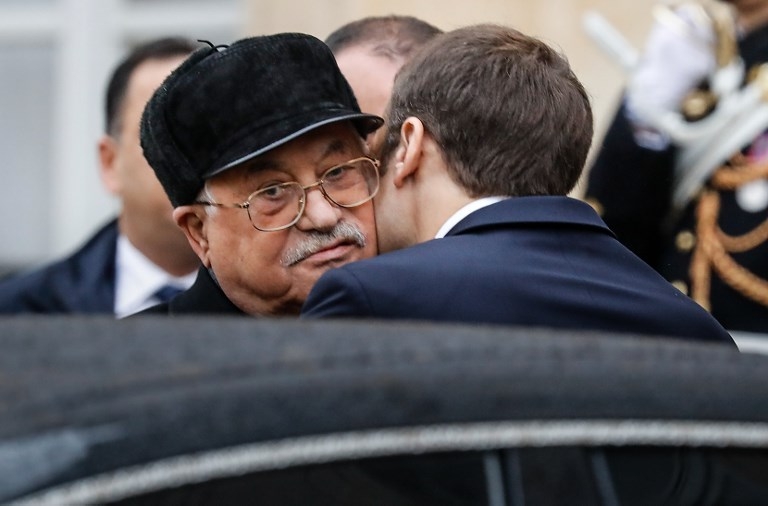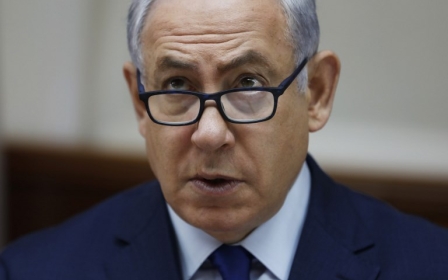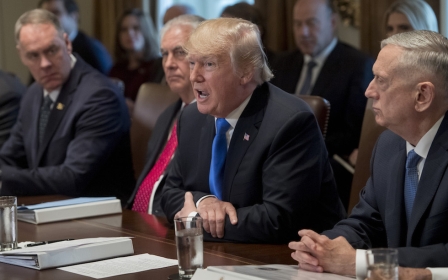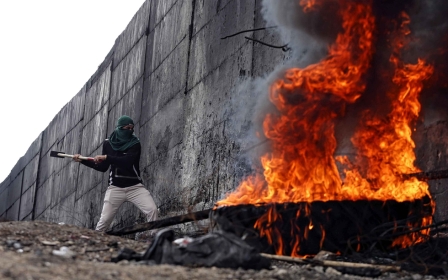Following UN vote, Abbas says US has disqualified itself from peace process

The United States has "disqualified" itself from the Middle East peace process due to its recognition of Jerusalem as Israel's capital, Palestinian President Mahmoud Abbas said on Friday, following a defiant vote against the US move at the UN a day earlier.
"The United States are no longer an honest mediator in the peace process, we will not accept any plan put forward by the United States," said Abbas, speaking through a translator at a joint news briefing in Paris with French President Emmanuel Macron.
The French president said that the US had "marginalised itself" in the Israeli-Palestinian conflict by unilaterally recognising Jerusalem as the capital of Israel.
"The Americans have marginalised themselves and I am trying to not do the same thing," Macron said.
'The Americans have marginalised themselves and I am trying to not do the same thing'
- French President Emmanuel Macron
Abbas also condemned a threat by US President Donald Trump to cut off financial aid to countries that voted at the United Nations against the US decision to recognise Jerusalem as Israel's capital.
On Thursday, more than 120 countries defied Trump and voted in favour of a UN General Assembly resolution calling for the US to drop its recent recognition of Jerusalem as Israel's capital.
US threats
Also speaking on Friday, Turkish President Tayyip Erdogan called for the United States to step back from its decision.
"Despite threats, the UN took an honourable stance," Erdogan said at a meeting of his AK Party in Istanbul. "The US should turn back from this wrong step."
Trump had threatened to cut off financial aid to countries that voted in favour.
"The US attitude ahead of the UN vote will be remembered in the history of democracy as an ugly and unforgivable act," Erdogan said.
Trump's warning appeared to have some impact, with more countries abstaining and rejecting the resolution than usually associated with Palestinian-related resolutions.
In the end 128 member states voted in favour of the motion, with nine opposing and 35 abstaining.
The nine countries which opposed were Guatemala, Honduras, Israel, Palau, the Marshall Islands, Micronesia, Nauru, Togo and the US.
"The White House picked up the phone and called these countries one by one, threatening them blatantly," Erdogan said, without elaborating.
Macron reiterated that France remained committed to a "two-state" solution, namely one in which Israel and Palestine peacefully co-exist side-by-side with one another.
Macron added that France would recognise a Palestinian state "at the right time", and not under pressure.
Malaysian Prime Minister Najib Razak vowed on Friday to use every means to protest against Trump's recognition of Jerusalem, a tough stand likely to win him support among Muslim voters.
Najib has been embroiled in a graft scandal over a state-run fund, and has faced unprecedented criticism from former ruling party stalwarts, making the support of members of the Muslim, ethnic Malay majority vital in a general election next year.
"We will continue to fight on this issue, using every available means, through political and diplomatic channels, through discussion and prayer, until one day, God willing, Jerusalem belongs to the Palestinian people," Najib told a rally of about 1,500 in the administrative capital of Putrajaya.
He said he would not "sacrifice the sanctity of Islam" despite his friendship with Trump. Najib visited the White House in September.
"It is our first duty as Muslims to uphold the religion. If Jerusalem is a sacred land for Muslims, then it is upon us to free it from the grasps of Zionists," Najib said.
Middle East Eye propose une couverture et une analyse indépendantes et incomparables du Moyen-Orient, de l’Afrique du Nord et d’autres régions du monde. Pour en savoir plus sur la reprise de ce contenu et les frais qui s’appliquent, veuillez remplir ce formulaire [en anglais]. Pour en savoir plus sur MEE, cliquez ici [en anglais].




